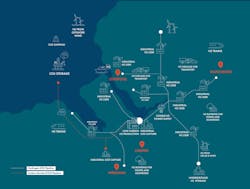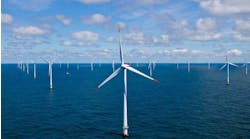HyNet confirmed as UK carbon capture, storage project
Offshore staff
LONDON – The HyNet Consortium Cluster onshore/offshore northwest England and north Wales has been accepted as a Track 1 project, under the UK’s carbon capture and storage Cluster Sequencing process.
Eni UK now expects to finalize terms with the UK government within a regulated business model to provide infrastructure for the transport and storage of CO2 by 2025.
This includes completion of arrangements with companies planning to use Eni UK’s offshore infrastructure in the depleted Liverpool Bay gas fields to capture their CO2 emissions for permanent storage.
HyNet includes plans for hydrogen production and subsequent distribution to industry through the development of a regional hydrogen market. It will also incorporate the direct capture of emissions from industries where fuel switching is not an option.
Through its affiliate, Liverpool Bay CCS Ltd., Eni UK will develop and operate both the onshore and offshore transportation and storage of CO2.
Organizations contributing to the HyNet Cluster Sequence submission included Progressive Energy, CF Fertilisers, Essar Oil UK, Hanson Cement, Viridor, Ince BioEnergy, Fulcrum Bioenergy, University of Chester, Peel NRE, Cadent, INOVYN, Uniper, Tarmac, Lhoist and Breedon.
Other carbon capture cluster projects under development and scheduled to be put forward for Track 2 of the government’s plan include Acorn (northeast Scotland), V Net Zero (in Humberside, northeast England), the Delphynus cluster in South Humber, and another in the Southampton area in southern England.
In total, they could help the UK capture up to 100 MM metric tons/yr of carbon to decarbonize the heavy freight and marine transport, steel, chemical and cement manufacturing sectors.
Oil and Gas UK sustainability director Mike Tholen said: “We are going to need all of these carbon capture and hydrogen projects and more if the [UK] is to become carbon neutral by 2050.
“Of all the carbon capture clusters in development, every single one of them involves an oil and gas company. With 50 years of expertise producing energy, the UK’s changing oil and gas industry is using its skills to help the country hit net zero.”
10/21/2021



